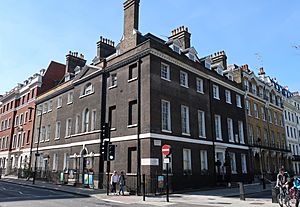Pushkin House, London facts for kids
Pushkin House (Russian: Пушкинский Дом) is the UK's oldest independent Russian cultural center. It was started in 1954 in London. Its main goal is to share and celebrate Russian culture. It also provides a place for people to meet and talk freely about different ideas.
Pushkin House hosts many events. These include talks, exhibitions, films, and concerts. They cover Russian literature, art, music, history, and current events. It is a charity that is not linked to any political group. It earns money from ticket sales and donations to stay independent.
Contents
History of Pushkin House
How Pushkin House Began
In 1953, a woman named Maria Kullmann saw a need for a neutral place for Russian culture in London. She and her friends bought a house at 24 Kensington Park Gardens. This house was meant for students and academics from all over the world. The first meeting of the Pushkin Club happened there in 1954.
Moving to New Homes
By 1956, the club needed its own space. So, they bought 46 Ladbroke Grove. This was their home until 2006. Then, Pushkin House moved to its current location at 5, 5a, and 6 Bloomsbury Square. This building is very old, from the 1740s, and is a special listed building.
A Place for Cultural Exchange
Since it started, Pushkin House has seen many changes in how Britain and Russia get along. When it first opened, there was a lot of interest in Russian culture. This was during a time called the "Khrushchev Thaw" in Russia. Famous Russian ballet companies, like the Bolshoi, started visiting the UK.
Many important scholars, writers, and artists from Russia's past came to speak at Pushkin House. People like Sir Isaiah Berlin and Tamara Karsavina shared their stories. Even Soviet writers visiting the UK would often come to talk. Pushkin House has always been a place where people with different views can meet and discuss things openly.
What Happens at Pushkin House
Pushkin House wants to be a home for Russian culture in London. It helps people from Britain and Russia share their cultures. It also teaches about Russian language and culture. It's a place where people and groups can find resources and connect.
Programs and Events
Pushkin House has many cultural programs. These include:
- Lectures and talks
- Seminars and conferences
- Exhibitions of art
- Film screenings
- Concerts and readings
Working with Others
Pushkin House also works with other groups that focus on Russian culture. It hosts talks for the Pushkin Club and the GB-Russia Society. You can also take Russian language courses there. They even work with museums and libraries in Russia.
Focus on Current Events
Since February 24, 2022, Pushkin House has focused on understanding the background of the Russo-Ukrainian war. They also support people who speak out against the war. They have held events to raise money for charities helping those affected by the conflict.
Pushkin House Book Prize
The Pushkin House Book Prize started in 2013. Its goal is to help people better understand the Russian-speaking world. The prize is for books published in English. Books translated from other languages, including Russian, are also welcome.
- Winners
- 2013 – Former People: The Last Days of the Russian Aristocracy by Douglas Smith
- 2014 – Red Fortress: The Secret Heart of Russia's History by Catherine Merridale
- 2015 – The Last Empire by Serhii Plokhy
- 2016 – Towards the Flame by Dominic Lieven
- 2017 – The Russian Canvas: Painting in Imperial Russia (1757–1881) by Rosalind P. Blakesley
- 2018 – The War Within by Alexis Peri
- 2019 – Chernobyl: The History of a Nuclear Catastrophe by Serhii Plokhy
- 2020 – The Return of the Russian Leviathan by Sergei Medvedev
- 2021 – The Human Factor by Archie Brown
- 2022 – Not One Inch by M. E. Sarotte
- 2023 – Overreach by Owen Matthews
- 2024 – I Love Russia by Elena Kostyuchenko
- 2025 – To the Success of Our Hopeless Cause : The Many Lives of the Soviet Dissident Movement by Benjamin Nathans
 | John T. Biggers |
 | Thomas Blackshear |
 | Mark Bradford |
 | Beverly Buchanan |


